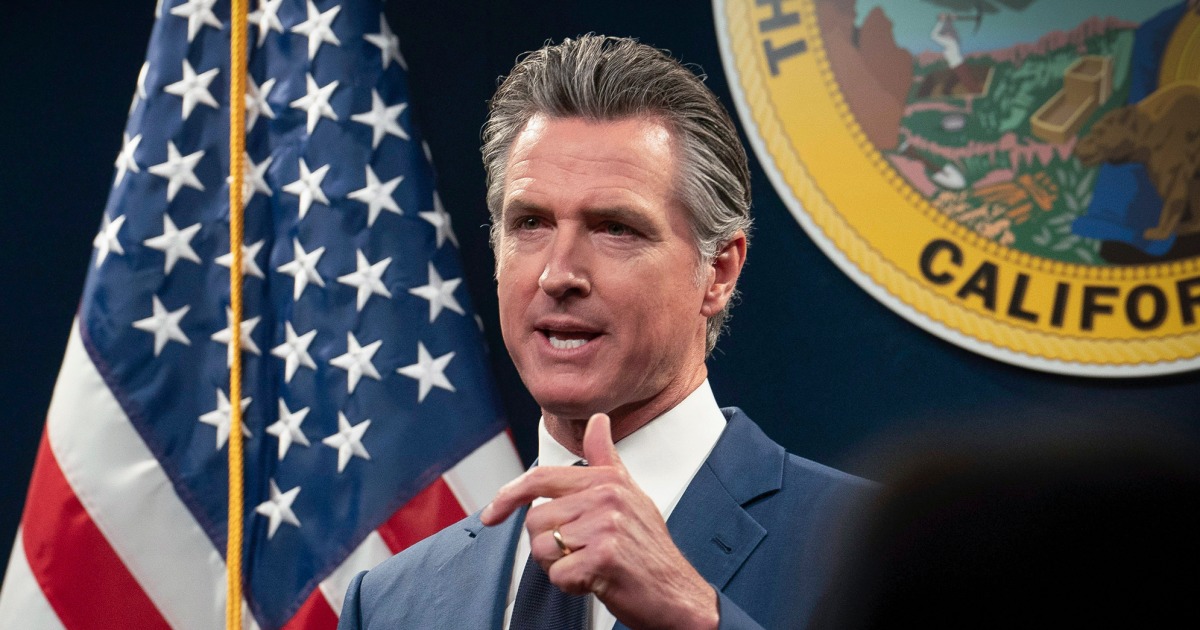Politics
As protests roil college campuses, young voters' support for Biden hangs in the balance

After days of protests roiling college campuses, President Biden broke his silence with a short, terse speech condemning the chaos and calling for order, while also holding up protest as a fundamental American right.
Will Biden’s comments be enough to sate young voters? Some political analysts think not.
“For Biden to get back on track with young voters, he needs to think and act differently and really take to heart what these young activists have been asking for,” said Diane Wong, assistant professor of political science at Rutgers University.
In a five-minute speech at the White House on Thursday, the president tried to balance two fundamental principles — the right to protest and the rule of law.
“Violent protest is not protected. Peaceful protest is,” he said. “Vandalism, trespassing, breaking windows, shutting down campuses, forcing the cancellation of classes and graduation — none of this is a peaceful protest.”
In addition to calling on their universities to divest from companies doing business in Israel, students have called on the administration to withhold military support from Israel. They’ve also urged Biden to push harder for a peaceful solution in the war between Israel and Hamas.
“Mr. President,” a reporter asked, “have the protests forced you to reconsider any of the policies with regard to the region?”
“No,” Biden said, turning away from the lectern and leaving the room.
Biden’s dismissive reaction to students’ concerns about Gaza has already hampered his campaign, Wong said, pointing out that students at Rutgers University, located in New Jersey, campaigned to push Democratic Michiganers to vote “uncommitted” rather than cast a ballot for Biden in Michigan’s primary.
For months, the Biden campaign has been pushing issues seemingly close to young voters’ hearts — forgiving student debt, advocating for abortion access and even reclassifying marijuana as a less dangerous drug. Still, Democratic strategist Carly Cooperman said, the campaign’s messaging is not cutting through to youth voters.
“We’ve seen poll after poll show that Biden is just underwater with this group,” Cooperman said.
Wong said the Biden campaign is banking on wooing young voters with issues other than Gaza.
“To me, that seems risky, and a move that Biden will likely regret come November,” Wong said. “Because yes, Gen Z are not single-issue voters, but they’ve collectively just experienced some of the worst political repression on college campuses that we’ve seen in decades. And trauma from from this kind of violence is remembered.”
Until this week, Biden had left it to other administration officials to speak out about the college protests. Former President Trump also has said relatively little, though on Wednesday he praised police for cracking down on protests at Columbia University, and called the students “raging lunatics” and “Hamas sympathizers.”
He mused about whether the students who vandalized campus buildings would be prosecuted in the same way as his supporters who ransacked the Capitol on Jan. 6.
Young voters famously don’t vote at the same rates as older adults and retirees. Still, their turnout has inched up in recent years. The 2022 midterms saw the second-highest percentage of voters ages 18-29 casting their ballots, said Mindy Romero, director of the Center for Inclusive Democracy at USC’s Price School.
A poll by Harvard’s Institute of Politics, released last month, found that more than half of Americans between 18 and 29 say they will vote in November — which is on par with its 2020 findings.
“Young people today have clear concerns about where our country is headed,” Setti Warren, director of the institute, said in a statement. “From worries about the economy, foreign policy, immigration, and climate, young people across the country are paying attention and are increasingly prepared to make their voices heard at the ballot box this November.”
One of the foremost issues young voters agree on is support for a cease-fire between Israel and Hamas. Slightly more than half of 18- to 29-year-olds support a cease-fire while 10% oppose, the Youth Poll found.
Biden’s dilemma with young voters over his handling of the Israel-Hamas conflict has become even more pronounced after a week of protests on college campuses. College-educated youth voters are both Biden’s most likely supporters and those most closely following news about the conflict.
The Harvard poll found that youth voters with a college degree are 50% more likely to pay attention to the news about Israel-Hamas, compared to 39% of current college students and 32% of those who never attended college.
Those voters without degrees present a particular challenge to Biden.
“There’s a lot of voters who don’t have college degrees,” Cooperman said. “And these younger people are really struggling with day-to-day cost of living and the impact of inflation. For them, they’re generally discouraged and unhappy with the status quo. And their current president is Biden. So there is an aspect of this that becomes a referendum on him.”
Trump’s support among young voters generally pales in comparison to his rival — Biden leads by 19% among likely voters under 30, according to the Harvard poll. But, the poll notes, “The race is even among those not in college and without a four-year degree.”
For college students, the war in Gaza is creating unusual momentum for political engagement, Romero said. Typically, she said, political issues in the news do not translate to droves of young voters going to the polls. But the Middle East war is different.
“The topic itself lends it, because of how big it’s intertwined with the Biden administration and their policies,” Romero said. “And it’s an election year, where they feel they have some power. There’s some consequence. They can hold the administration accountable.”
Campaigns would be smart to capitalize on the youth engagement by offering a listening tour, she added.
“Just from an engagement, democratic process perspective, this is an opportunity for the president for both parties to talk to young people about what they care about, and campaign around their positions,” Romero said, while acknowledging, “This is of course an incredibly difficult issue to navigate.”
While Biden has been reluctant to address young voters directly on the issue, Rep. Ro Khanna (D-Fremont) is one of the Biden campaign’s go-to surrogates grappling with Gaza.
Though Khanna supports the president, he has has been outspoken about his belief that the U.S. should refrain from sending more military aid to Israel, and has been open about his disagreements with Biden on the issue.
In a recent visit to the University of Wisconsin Madison, Khanna asked a roomful of Jewish and Muslim students about their views on Biden, according to a video he posted to X Wednesday.
“The generation in Washington, regardless of party, has been unable to solve it,” Khanna said of the Middle East conflict. “And my hope is more with your generation.”
The school year will soon end, and there’s no telling where pro-Palestinian encampments on campuses — or young voters’ support for Biden — will go.

Politics
Voters, worried about inflation, are favoring Trump in swing states, poll shows
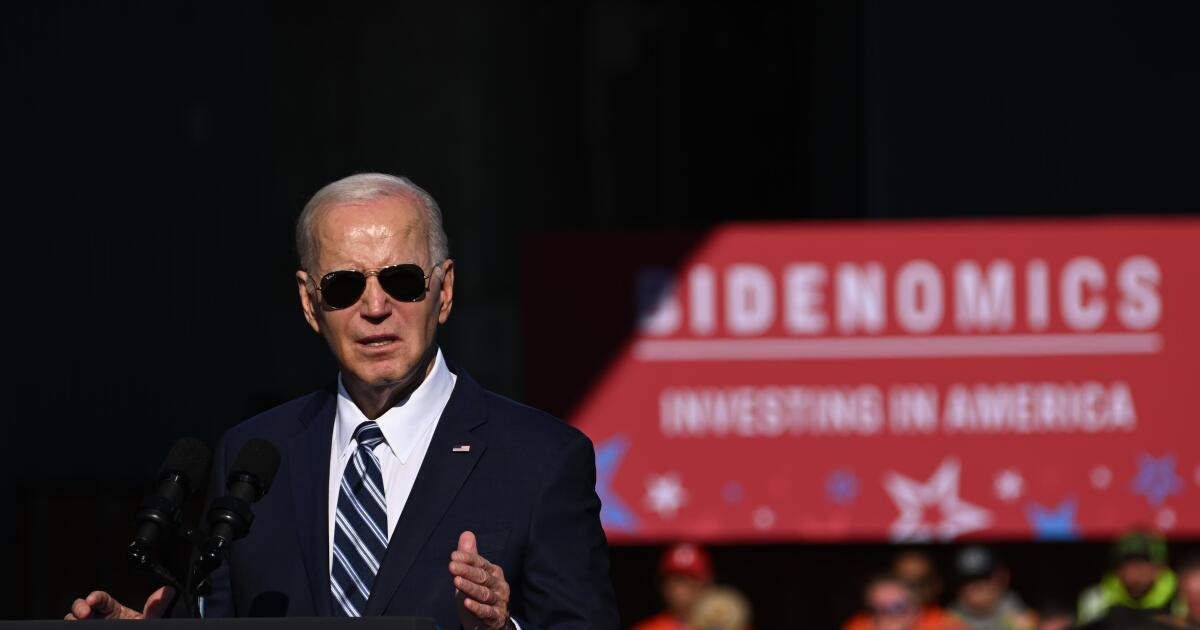
Former President Trump narrowly leads President Biden in six of the seven states considered key in this year’s election rematch, an advantage powered by the perception that the Republican challenger would do a better job controlling inflation, according to a poll released Thursday.
Trump’s overall advantage in the seven states stands at 47% to 44%, a margin that grows to five percentage points in a five-way contest that includes independent Robert F. Kennedy Jr., Green Party candidate Jill Stein and independent Cornel West, according to the Swing State Survey, overseen by the Cook Political Report and two polling firms.
Trump’s lead in the head-to-head contest is a modest one: at or less than the margin of sampling error in four of the states — Arizona, Georgia, Michigan and Pennsylvania.
The former president holds a wider lead in Nevada and North Carolina, 9% and 7%, respectively, while the two are tied, 45% to 45%, in Wisconsin, the poll found.
While inflation has subsided substantially since its peak in the second half of 2022, many voters remain preoccupied with high prices. The Cook survey found that a significant majority of voters think Biden has control over inflation. But just 40% in the seven swing states think prices would be brought under control if he wins a second term, while 56% said they think a Trump presidency would usher in lower inflation.
Biden has an advantage among voters with his support of abortion rights, but the poll showed more voters are focused on economic issues. When nearly 4,000 voters across the seven states were asked what concerns them more, Biden overseeing economic policy or Trump setting policy on abortion, 55% said they were more worried about Biden handling the economy than they were about Trump setting policy on abortion (45%).
“At this point … the defining issue for this contest is a more traditional one: the economy,” Amy Walter, editor in chief of the Cook Political Report, wrote in an analysis of the results.
“While abortion remains a strong issue for Democrats, President Biden’s advantage on the issue isn’t strong enough to offset Trump’s overall strength on bringing down the cost of living,” Walter wrote. “Biden’s overall weak position, combined with voters’ deep worry about rising costs, is currently limiting his ability to make the case that Trump is the bigger risk.”
Both candidates face other challenges, with Biden’s “age and ability to complete his term” cited by slightly more potential voters than Trump’s “temperament and legal problems” — by a 53% to 47% margin. Biden is 81 years old, Trump is 77.
“The race is still close because both candidates’ personal weaknesses make it hard for them to leverage the issues that should benefit them,” Walter wrote.
Trump did marginally better in four of the seven key states in a hypothetical race including the additional candidates. The Cook survey showed the former president ahead in that scenario, 43% to 38%, with 8% for Kennedy.
Joining the Cook Report in conducting the survey was BSG, a polling firm tied to Democrats, and GS Strategy Group, a firm that mostly works with Republicans. The pollsters reached voters between May 6 and 13. Of those who responded, 85% said they were “absolutely certain” or “very likely” to vote.
Politics
New Hampshire political consultant behind AI-powered Biden robocalls hit with 24 criminal charges, $6M fine
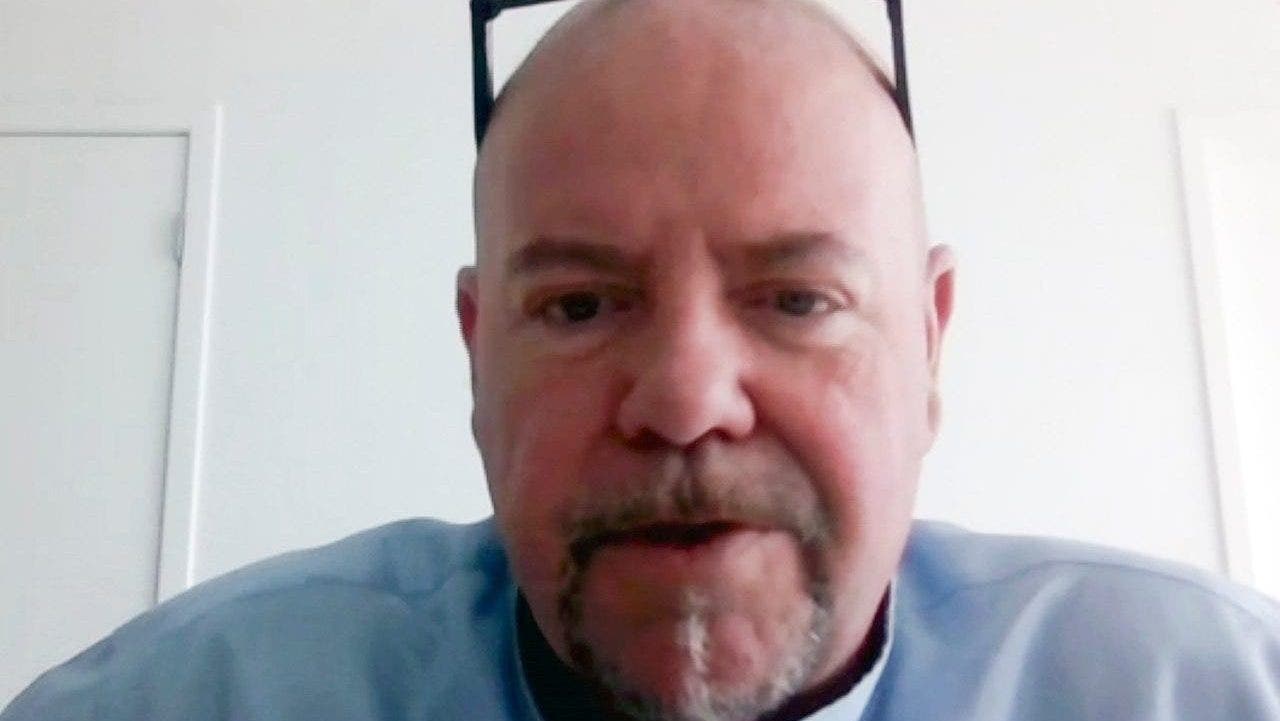
The New Hampshire political consultant behind robocalls mimicking President Biden is now facing 24 criminal charges, 13 of which are felony counts.
Steve Kramer admitted to commissioning robocalls that used artificial intelligence to generate a voice similar to President Biden encouraging recipients not to participate in the primary.
The Federal Communications Commission also announced $6 million in fines against Kramer.
“It’s important that you save your vote for the November election,” the illicit calls stated, according to New Hampshire Attorney General John Formella. The calls added, “Your vote makes a difference in November, not this Tuesday.”
NEW HAMPSHIRE INVESTIGATING FAKE BIDEN ROBOCALL TELLING VOTERS NOT TO PARTICIPATE IN TUESDAY’S PRIMARY
In this image taken from video, Steve Kramer speaks during an interview in Miami. (AP Photo)
“After we received multiple reports and complaints on the day these calls were made and the day after these calls were made, my office immediately opened an investigation,” Formella said.
He described how his office’s Election Law Unit worked with the Anti-Robocall Multistate Litigation Task Force, a bipartisan task force made up of 50 state attorneys general and the Federal Communications Commission Enforcement Bureau.
Kramer previously told local outlet News 9 he produced the phone calls as a stunt to demonstrate the need to regulate AI technology.
NEW HAMPSHIRE AG TRACES ROBOCALLS WITH ‘AI-GENERATED CLONE’ OF BIDEN’S VOICE BACK TO TEXAS-BASED COMPANIES
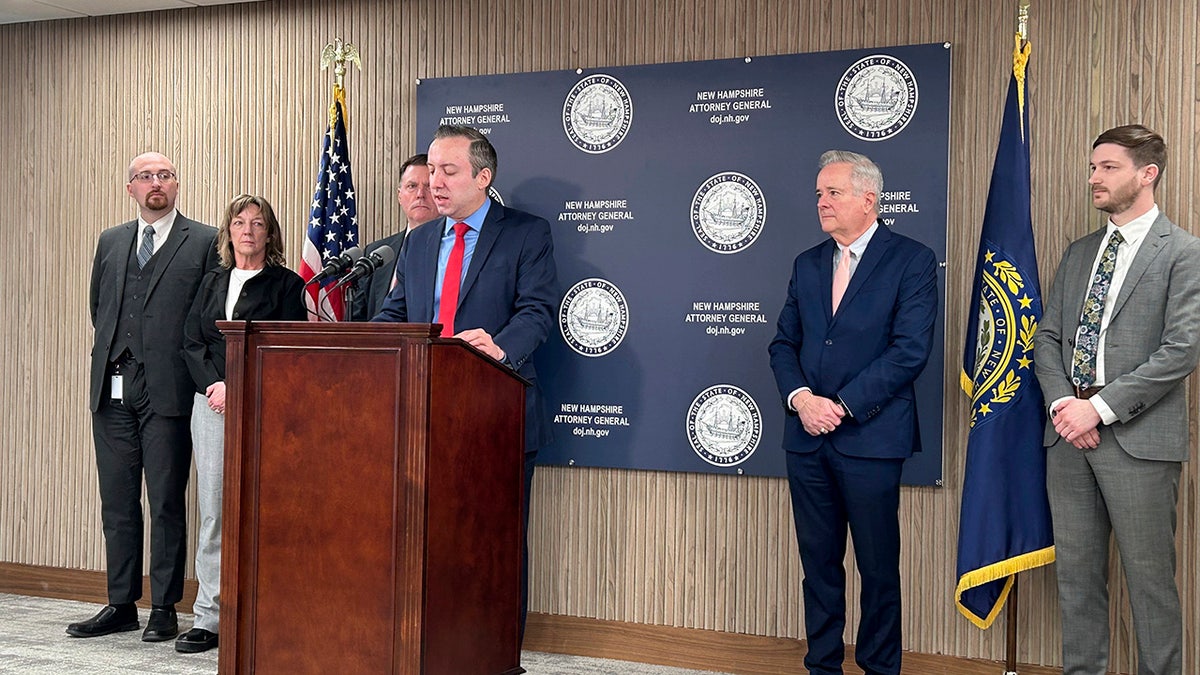
New Hampshire Attorney General John Formella describes the investigation into robocalls that used artificial intelligence to mimic President Biden’s voice and discourage people from voting in New Hampshire’s first-in-the-nation primary during a news conference in Concord, N.H. (Amanda Gokee/The Boston Globe via AP)
“Maybe I’m a villain today, but I think, in the end, we get a better country and better democracy because of what I’ve done, deliberately,” Kramer previously said of the investigation.
The New Hampshire robocalls sparked immediate action in outlawing deep fakes impersonating political candidates. The FCC ruled the practice illegal in February.
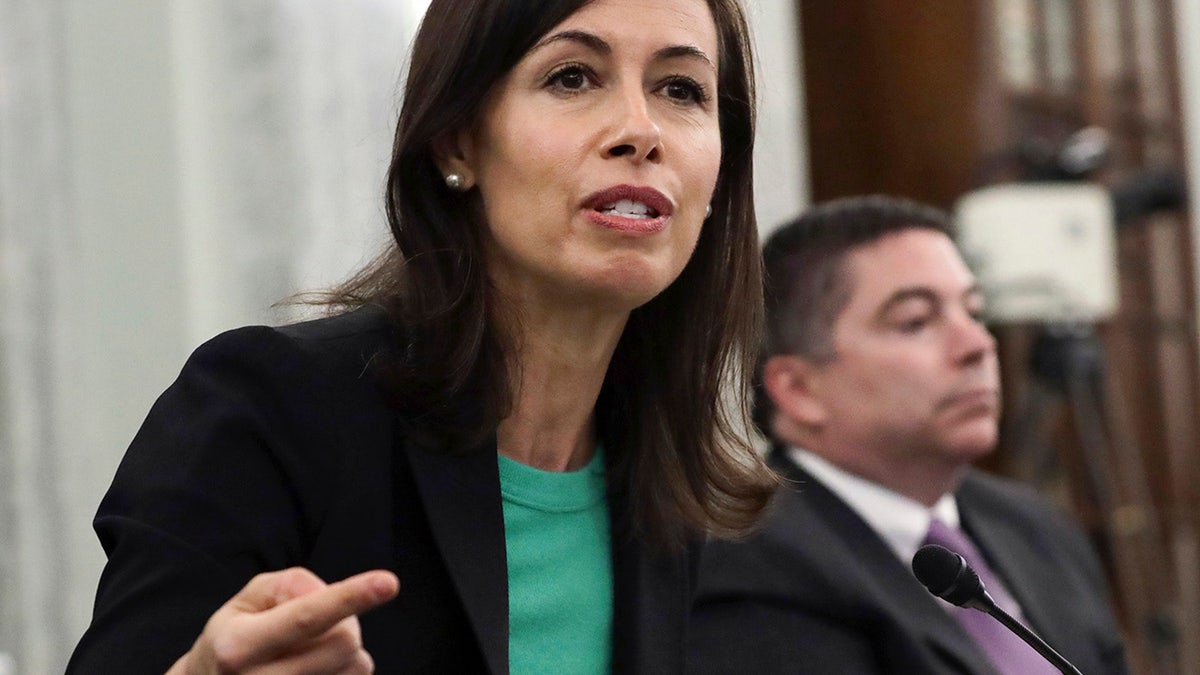
Federal Communications Commission Chairwoman Jessica Rosenworcel speaks during a hearing on Capitol Hill in Washington, D.C. (Alex Wong/Pool via AP, File)
With the unanimous adoption of a ruling that recognizes calls made with AI-generated voices as “artificial” under the Telephone Consumer Protection Act (TCPA), a 1991 law restricting junk calls that use artificial and prerecorded voice messages, the FCC said it was giving state attorneys general new tools to go after those responsible for voice-cloning scams.
WHAT IS ARTIFICIAL INTELLIGENCE (AI)?
“Bad actors are using AI-generated voices in unsolicited robocalls to extort vulnerable family members, imitate celebrities and misinform voters. We’re putting the fraudsters behind these robocalls on notice,” FCC Chairwoman Jessica Rosenworcel said in a statement.
“State Attorneys General will now have new tools to crack down on these scams and ensure the public is protected from fraud and misinformation.”
Fox News’ Danielle Wallace and The Associated Press contributed to this report.
Politics
Supreme Court OKs shift of Black voters to shore up GOP congressional district
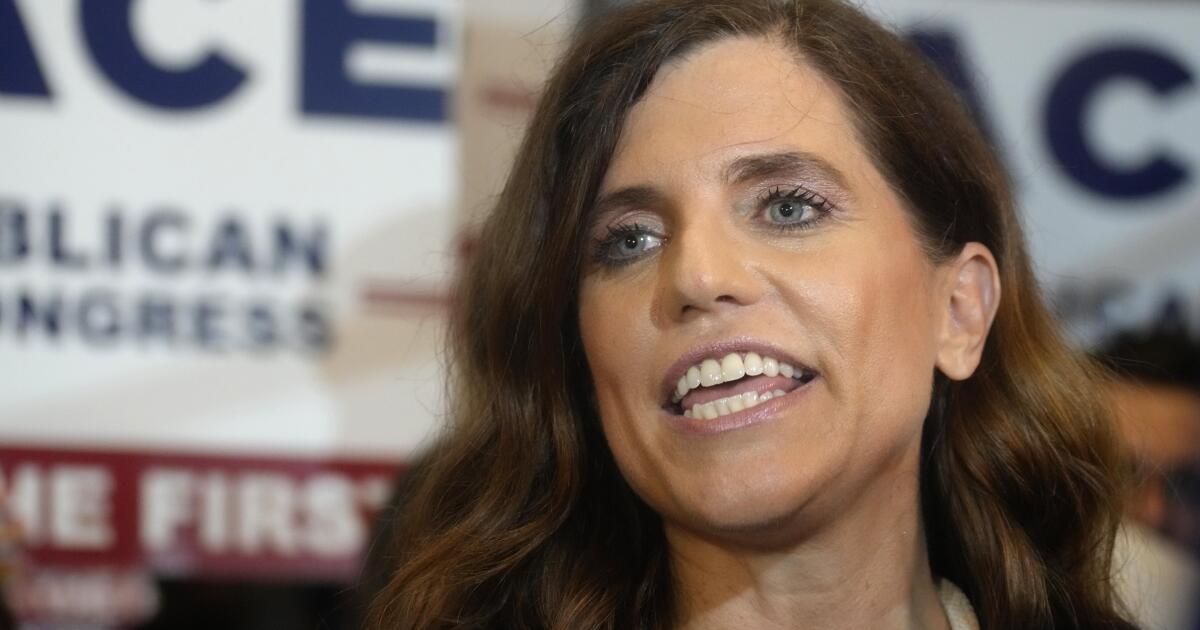
The Supreme Court ruled Thursday that a state’s mapmakers may shift tens of thousands of Black voters to a different district if they were seeking to shore up a partisan advantage for a Republican candidate.
In a 6-3 decision, the justices upheld a redistricting map drawn by South Carolina’s Republican Legislature and overturned a lower court ruling that called it a “stark racial gerrymander.”
At issue was whether the state legislators drew the districts for political or racial reasons.
All six Republican appointees were in the majority and said the legislators were motivated by partisan concerns, while the three Democratic appointees dissented and said voters were shifted based on their race.
In the past, the court had said that partisan gerrymandering is legal and as old as the nation, but racial gerrymandering is discriminatory and unconstitutional.
The justices reasoned that the Constitution permits elected officials to make decisions based on political considerations, but the 14th Amendment forbids the government from making decisions based on race.
Not surprisingly, however, those two principles come into conflict in the drawing of election districts. At issue in the South Carolina case was a congressional district in the Charleston area held by Republican Rep. Nancy Mace.
That district had regularly elected Republicans, but a Democrat won it in 2018 in what was described as a major upset. Mace ran in 2020 and won a narrow victory.
When the South Carolina Legislature redrew its seven districts in response to the 2020 Census, the mapmakers sought to shore up her district as a Republican stronghold. They shifted more than 30,000 Black voters from Mace’s district in Charleston into a Black-majority district held by Rep. James E. Clyburn, the state’s lone Democrat.
Lawyers for the NAACP Legal Defense Fund and the ACLU sued and argued the state’s redistricting plan was unconstitutional. They won a ruling from a three-judge court which said “race was the predominant motivating factor” in the drawing of Mace’s district.
Justice Samuel A. Alito Jr, speaking for the court, said the evidence showed that partisan motives were driving force.
“To untangle race from other permissible considerations, we require the plaintiff to show that race was the predominant factor motivating the legislature’s decision to place a significant number of voters within or without a particular district,” Alito said. He added that the plaintiffs did not show race was the dominant factor in drawing the districts.
Justices Elena Kagan, Sonia Sotomayor and Ketanji Brown Jackson dissented.
“What a message to send to state legislators and mapmakers about racial gerrymandering,” Kagan said in dissent. “Go right ahead, this court says to states today. …In the electoral sphere especially, where ugly patterns of pervasive racial discrimination have so long governed, we should demand better— of ourselves, of our political representatives, and most of all of this court.”
Unlike other redistricting cases from Alabama and Louisiana, the immediate impact of the South Carolina case looks to be limited.
Civil rights lawsuits in Alabama and Louisiana led to the creation of a second Black-majority district where a Democrat could be elected. The South Carolina litigation did not involve a possible second Black-majority district.
In March, the three judges who had struck down Mace’s district issued an order that allows this year’s election to proceed using the state’s preferred map.
-

 World1 week ago
World1 week agoPro-Palestinian university students in the Netherlands uphold protest
-

 Politics1 week ago
Politics1 week agoDem newcomer aims for history with primary win over wealthy controversial congressman
-

 Politics1 week ago
Politics1 week agoSouthern border migrant encounters decrease slightly but gotaways still surge under Biden
-

 Politics1 week ago
Politics1 week agoWhite House walks diplomatic tightrope on Israel amid contradictory messaging: 'You can't have it both ways'
-

 World1 week ago
World1 week agoSlovakia PM Robert Fico in ‘very serious’ condition after being shot
-

 World1 week ago
World1 week agoCanadian Nobel-winning author Alice Munro dies aged 92
-

 News1 week ago
News1 week agoDespite state bans, abortions nationwide are up, driven by telehealth
-

 Politics1 week ago
Politics1 week agoVulnerable Dem incumbents move to the center in key swing states as Biden panders to far-left base











